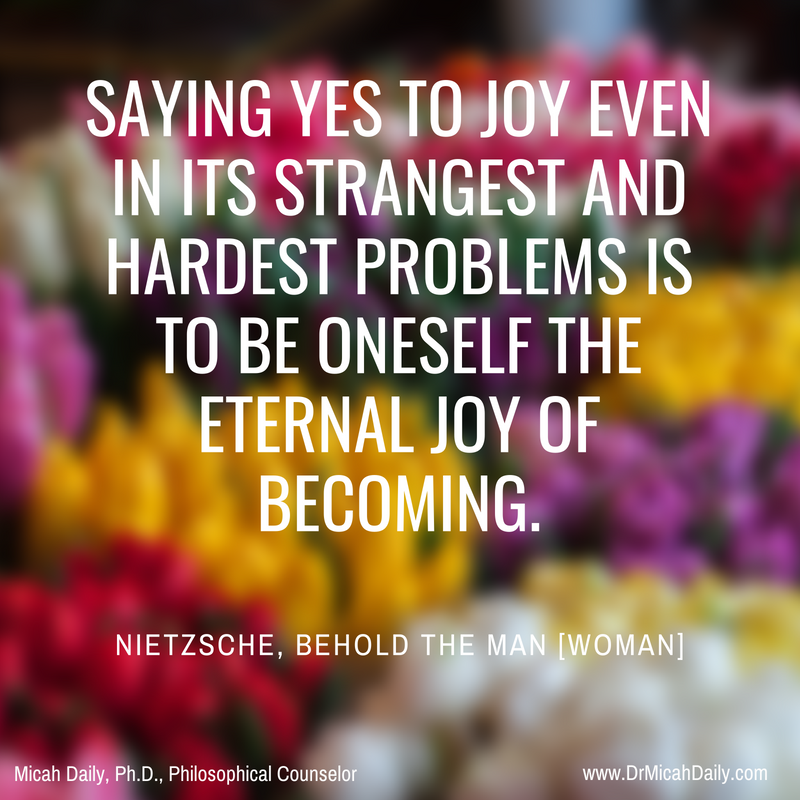Have you ever made a dandelion wish? Some people believe dandelion seeds fulfill one's dreams and carry thoughts to loved ones. What do you believe?
What is philosophical counseling?
Philosophical Counseling (PC) is an alternative to traditional kinds of counseling and therapy. It is an exploration of self — an invitation to stir up the sediment of your life — to question, to challenge, to become a version of yourself that has been lost, forgotten or not yet discovered.
PC is the application of practical philosophy, the love of wisdom, to everyday experience to improve the quality of your life. The process includes but is certainly not limited to an examination of your reasoning and decision making. We talk about life — Is it meaningful? What is the right thing to do? How can I know I am making a good decision? What does love feel like? Can I trust myself? Does happiness matter? What are my dreams telling me? The experience is different for each individual because in PC, you are invited to listen to the music of your soul.
“To believe your own thought, to believe that what is true for you in your private heart — that is genius." -Ralph Waldo Emerson
We all need tools to deal with life and philosophy has a storehouse of wisdom for most every challenge. For example, Marcus Aurelius, ancient Roman philosopher, provides the steps to take when you have been offended. And without a doubt, we’ve all been there!
Philosophical Counseling does not presuppose, diagnosis, or treat mental illness. In PC, it is understood that living is a fluid process and ever changing.
“You cannot step into the same river twice.” -Heraclitus, PreSocratic Philosopher
Therefore, you are never stuck but rather on a continuum of tasting life’s pleasures and pains, joys and sorrows. You might experience anxiety, but you are not defined by the experience of being anxious. People are more complex than any one concept.
Changing the way you identify with yourself is liberating and leads to a more satisfying life, a new sense of wellbeing, more curiosity, energy, and joy!
What is philosophy?
First, let’s start with the meaning of the word “Philosophy”.
Philo is a Greek word that means love.
Sofia is a Greek work that means wisdom.
Therefore, Philosophy means love of wisdom.
The academic discipline of philosophy is the study of the fundamental nature of knowledge, reality, and existence. Philosophy as applied to everyday experience is a kind of therapy. Epicurus, Ancient Greek Philosopher, thought philosophy "therapy for the soul.”
Western philosophy began during the Golden age of Greece, 2,500 year ago. At that time, written above the entrance to the Oracle at Delphi (the place people visited when reason could not yield answers) were two sentences.
1. Know Thyself
Socrates, Ancient Greek Philosopher, said, “The unexamined life is not worth living.” In Philosophical Counseling, you examines your thoughts, beliefs, and opinions to see if they really reflect who you are today. It is an adventure in discovering and developing yourself. We start with today, what's happening in your thoughts and life now, to help you become who you want to be!
2. Nothing in Excess
This applies to all aspects of life, including politics, culture, art, food, desire, and so on! When you over indulge, the pleasure disappears. Therefore, you might examine where you are excessive — social media, politics, desire, dreams, work, and so forth.
In Philosophical Counseling, clients develop greater confidence in their thinking and decision making. This results in less stress and anxiety and much more joy! In philosophy, where reason cannot determine answers with certainty, we turn to belief, faith, and dreams to choose the answers that best serve you in living a good and happy life!
10 questions that often arise in philosophical counseling
1. What is happiness?
2. Why do I exist?
3. What is love?
4. Why should I be good?
5. What is true friendship?
6. Do we have free will?
7. Do animals have souls
8. What is a good life?
9. Does intuition yield the truth?
10. What can I know?
If you were to have a philosophical counseling session with me, what questions would you want to ask?
PHilosophical counseling - It Can change your life for the better!
I often speak with people who have been shamed for asking questions, admonished for “thinking too much” and criticized for seeing things in a wider framework than their family, friends, co-workers, neighbors, and classmates. Philosophical Counseling (PC) helps one to be in awe of one’s curiosity, to wonder with abandon, to engage in conversation about one’s questions, and embrace the gift of one’s wider perspective. In this way, one is not thinking too much, ever. Instead, one develops sensible ways of thinking that feel right and productive, and bring about greater satisfaction and joy.
We are all vastly different and in PC, we unearth your individuality. We do not look at the past as causing some failure in your present. Instead, we examine what is happening now. What is satisfying and dissatisfying? We examine your unique questions, desires, dreams and bring them to fruition.
Academic Coaching - Another good reason to see me!
Is your child struggling with study skills, memorization, test-taking strategies or having trouble coping on campus? Are you returning to college and want to feel confident in your new adventure? With over 20 years of University experience as a Professor of Philosophy and an Academic Coach, I can provide the guidance and tips needed for your student and you to succeed.
“We must remember that the future is neither wholly ours nor wholly not ours, so that neither must we count upon it as quite certain to come nor despair of it as quite certain not to come. ”














